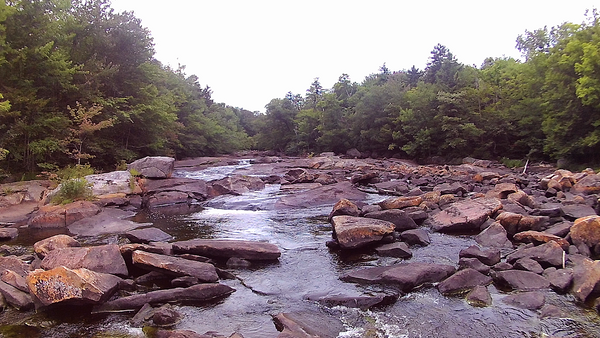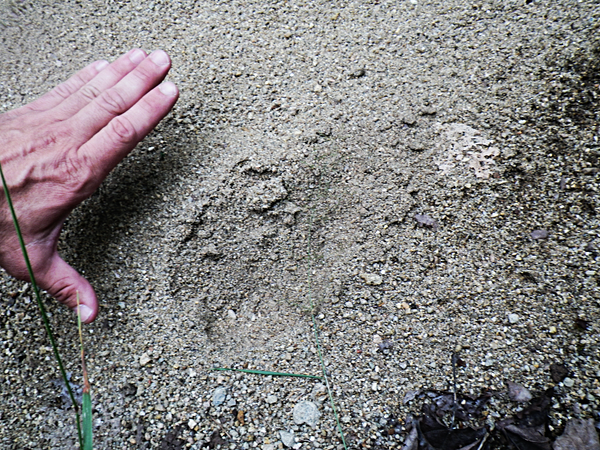Moose Tracks and Creek Chubs by Mark Usyk
Miles of dirt road. Miles. Sometimes the dirt was altogether missing, replaced by steep grades of bowling ball sized cobble stone and jagged points of granite sticking straight up like the earth trying to jab an elbow to the oil pan of the truck as it passed over. I’d look back over my shoulder, standing on the floor boards of the four wheeler, and watch the full size pick up bounce up and down and jiggle side to side like a bowl of rusty and dented Jell-O as it made its way over what was once used to haul timber for cash. The farther we went, the worse the road got. Until finally “the road” turned into a two track path, and then lastly what could be described best as a trail wide enough for a vehicle. And then we parked at the bridge the truck couldn’t cross, for fear of a catastrophic collapse, and the four wheeler hauled in the packs and gear and fly rod tubes and food the last distance.
The fly rod tubes, the way I saw it, were probably a waste of time and space. Most of the state was in a drought, and coupled with the hot summer, the water temps would most likely be way too high to even think about casting to water that held brook trout. But, fisherman, and especially fly fishermen, are an optimistic bunch of hopefuls. There was always that chance that up here in the headwaters there could be spring creeks dumping cold water in, or spring holes unknown hidden in the bottom structure pushing up cool currents, or that somehow the waters this far up could just be cooler out of principle, the fish to be found happy and energetic in some deep and shaded run. But it was just as likely that aliens would land a ship next to the truck at the bridge and ask us for fly casting lessons. Either way we’d have the situation covered, the fly rod tubes leaned against the wall in the camp. But like I said, I figured they were a waste of time. I just wanted to believe it was possible.

Sixty yards from the camp door John sunk his thermometer in the biggest pool to be found in the rock garden that normally passed for an Adirondack river, and our fears were confirmed when it showed 73 degrees. That was that. There wouldn’t be a single brookie caught and released that would survive these conditions. They were already fighting for their very survival as it was. I wasn’t at all surprised, so there wasn’t much to be let down about. Normally for me catching a fish would be the bonus on a short outing. This time, the act of fishing itself would have been a bonus. I’d be happy enough to rock hop up and downstream and scout, knowing that in the fall John would once again invite me up to this private piece of brook trout bum paradise. That may have been the optimistic and the hopeful coming out in me.
So the rest or the day was spent exploring. I found it ironic and painful that what looked like, and was sometimes referred to as a blue line on the maps was nothing more than a line of boulders and rocks cutting through the north woods now. Water still flowed, but I could make it from one side to the other nearly anywhere I wanted. Hardly ever was there a run so wide that I couldn’t find enough dry stone to place my feet and keep them dry by either a long step or a foolhardy leap, save for the few scattered pools. The pools themselves, while the largest concentrations of moving water in sight, could be seen to be a third of their usual sizes by studying the water lines on the surrounding granite. None the less, the scenery of water cascading around, between, and under boulders to pour into the pools and then exiting in the same manner was almost enough to make you forget about the plight of the brookies surely hunkered down in the deepest crevices to be found, out of sight but not out of mind. Almost.

John said he’d been told there was a Stillwater downstream, so while a dinner of sausage, onions, peppers and potatoes cooked in the ancient stove in the camp kitchen, we took a short hike to see if we could find it. We did fairly easily, it was large and slow, and still relatively deep as far as these northern blue lines go even in a drought, but no more cooler than any other stretch. I’d brought my 2/3wt just in case, almost hoping that the act of carrying it would prove something to someone up above and that the water would suddenly drop five or six degrees. In the head of the pool I could see small shapes moving with a slow current in a dark hole next to a large flat rock. There was no doubt in my mind that they weren’t trout, but curiosity got the better of me so I’ll admit to tying on the smallest fly I had, some little brown buggy looking thing in about a size 16. On my second cast a shape shot up from the dark and seconds later I held a three inch creek chub in my hand. “Well,” I thought to myself, “At least you can say you caught something.” John chuckled from the bank behind me as I attempted to catch another. I must have cast another ten times but couldn’t hook another one, even though the fly had now taken on water and sank down to the chubs and I could just make out the silhouettes of the tiny fish as the brown fly was tugged and jerked from all directions. I remembered how it felt to be a kid watching tiny pumpkin seeds nibble worms off hooks piece by piece off the end of a dock, and then I remembered the sausage in the oven back at camp and how hungry I was.
The rest of the evening was spent sitting around the table telling stories under the dull glow of murphy lights and oil lamps casting shadows across the old cast iron skillets hanging on walls, and patting Gunner on the head, a German Short Haired Pointer, who wanted only two things in life at the moment. To run the woods in search of game and a piece of sausage, not necessarily in that order. We picked up empty plates with full bellies and moved to the next room where we sat around for a couple more hours, telling more stories of past fishing trips and hunting trips, of old jobs and old friends, and when we finally turned in I couldn’t help but close my eyes and not fall right to sleep, but instead relive some old stories in my head once more while the water passing by outside the windows told its own to whomever would listen.
I could have gone somewhere to chase smallmouths, somewhere to actually cast the fly rod with a purpose, somewhere warm water would have been fine and fish would have been happy to chase down a streamer. But I took a chance on an invite to check out some private water “up north,” to meet new friends, one who happened to be a dog, the other his owner. We found a moose track, which in my book is only second to seeing an actual moose, and I caught a creek chub that most anglers wouldn’t ever cast to let alone admit to catching.

I can appreciate an old camp with history. I can appreciate a good dog and good friends sitting around a table trying to identify stone flies on the window attracted by an oil lamp, and I can appreciate an invitation to a place I otherwise would never know about and never have the chance of seeing first hand. But the thing that I can appreciate the most is something that can’t be put into words easily. It’s something to do with the voice of the river moving between the rocks and boulders carrying through the open windows of an old logging camp in the north country as you drift off to sleep. Hoping you dream of brook trout and moose and knowing that you’ll wake up to the river, its voice still heard over the breeze that rustles the leaves in the trees.
